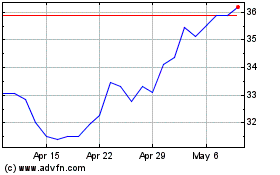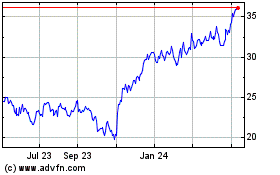Indian Consumers Prefer Digital Payments Over Cash this Festival Season, Embracing UPI and Digital Wallets for Merchant Spend...
October 23 2019 - 12:00AM
Business Wire
Growing strength of digital payments in
merchant payments channel, increasing ubiquity driven by younger
consumers, according to new study by ACI Worldwide
Digital payments are the preferred payment option for 42 percent
of consumers in India, leading card payments (29%) and cash (27%),
according to a new online study conducted by YouGov and ACI
Worldwide (NASDAQ: ACIW), a leading global provider of real-time
electronic payment and banking solutions.
While preference for digital payments – including eWallet and
UPI payments – is more pronounced with younger consumers (42% for
Gen Z and 48% for Millennials), the survey revealed a more
consistent picture across age groups in terms of adoption. 77
percent of Millennials had used digital payments at least once
during the festival season, compared to 72 percent of Gen Z and 69
percent of Gen X. Nearly half (45%) of Baby Boomers also indicated
they had used digital payments within the survey period.
“Digital payments, including UPI and other eWallets, are
increasingly the payment method of choice across a wide spectrum of
consumers in India,” said Kaushik Roy, vice president & country
leader – South Asia, ACI Worldwide. “While there is still a
perception that UPI, for example, is primarily for the peer-to-peer
channel, this study shows that significant inroads are being made
in the merchant payments channel. With monthly transactions on the
UPI platform nearing one billion, and credit and debit card usage
at the POS experiencing double-digit annual growth, digital and
card payments will continue to make inroads into the cash
economy.”
44 percent of respondents used digital payment methods for
low-value payment (less than 1,000 INR) via a merchant website
(eCommerce) or app (P2M), indicative of the progress made by
digital payments in the merchant channel. However, banks, fintechs
and merchants should be aware that 40 percent of those surveyed
consider data privacy as a top area of concern when it comes to
digital payments.
Other key findings and trends:
Payment behaviors and spending patterns
- 43 percent of respondents used digital payment methods
regularly (at least 2-3 times per week) during the festival period,
with 15 percent purchasing this way once or more per day.
- 32 percent have not used cash for festival season purchases,
indicating that for some, festival season spending is becoming a
largely cashless affair.
- Only one in ten respondents (10%) claimed to have not made a
digital payment method at all in the period leading up to
Diwali.
- Peer-to-peer (P2P) payments were made by 36 percent of
respondents for low-value payments (less than 1,000 INR) and 37
percent for high-value payments (more than 1,000 INR) during the
festival season.
Consumer concerns and industry opportunities
- Internet connectivity (a prerequisite to most digital payment
methods) is a top concern for 44 percent, while failed transactions
(36%), problems processing refunds (32%) and fraud (29%) also
identified as major concerns.
- Only 21 percent of respondents cited lack of clarity about fees
as a top concern and 23 percent lack of acceptance infrastructure
at merchants, reflecting increasing ease of use for customers and
greater merchant acceptance.
- Queried about what would encourage more frequent usage of
digital payments, 42 percent said better rewards (discounts,
incentives or cashbacks); 24 percent cited faster and more
frictionless checkout.
As per data released by NPCI, UPI transactions hit an all-time
high of 955.02 million in September 2019 as compared to 918.35
million in August. There has been a 135 percent YoY increase in the
number of transactions and UPI is soon expected to cross one
billion monthly transactions.
Mandy Killam, EVP Growth Markets, ACI Worldwide, will be joined
by George Sam, co-founder, Mindgate Solutions, to deliver the
presentation “Addressing the APAC Opportunity and the Growth of UPI
Transactions” at 10:25am, Sunday, October 27 at Money20/20 USA.
Survey Methodology:
All figures, unless otherwise stated, are from YouGov Plc. Total
sample size was 1,025 adults. Fieldwork was undertaken between
October 9-15, 2019. The survey was carried out online. The figures
have been weighted and are representative of all Indian adults
(aged 18+). Generations were defined as follows: Gen Z (born after
1999, 201 total), Millennial (born 1982-1999, 488 total), Gen X
(born 1965-1981, 279 total), and Baby Boomer (born 1946-1964, 57
total).
About ACI Worldwide
ACI Worldwide, the Universal Payments (UP) company, powers
electronic payments for more than 5,100 organizations around the
world. More than 1,000 of the largest financial institutions and
intermediaries, as well as thousands of global merchants, rely on
ACI to execute $14 trillion each day in payments and securities. In
addition, myriad organizations utilize our electronic bill
presentment and payment services. Through our comprehensive suite
of software solutions delivered on customers’ premises or through
ACI’s private cloud, we provide real-time, immediate payments
capabilities and enable the industry’s most complete omni-channel
payments experience. To learn more about ACI, please visit
www.aciworldwide.com. You can also find us on Twitter
@ACI_Worldwide.
© Copyright ACI Worldwide, Inc. 2019
ACI, ACI Worldwide, the ACI logo, ACI Universal Payments, UP,
the UP logo and all ACI product/solution names are trademarks or
registered trademarks of ACI Worldwide, Inc., or one of its
subsidiaries, in the United States, other countries or both. Other
parties' trademarks referenced are the property of their respective
owners.
View source
version on businesswire.com: https://www.businesswire.com/news/home/20191022005786/en/
Shivani Joshi Archetype E-mail: shivani.joshi@archetype.co
Phone: +91-98709 08500
Christopher Taine ACI Worldwide E-mail:
christopher.taine@aciworldwide.com Phone: +49 (0) 89 45230 557
Dan Ring Email: dan.ring@aciworldwide.com Phone: +1 (781)
370-3600
ACI Worldwide (NASDAQ:ACIW)
Historical Stock Chart
From Mar 2024 to Apr 2024

ACI Worldwide (NASDAQ:ACIW)
Historical Stock Chart
From Apr 2023 to Apr 2024
